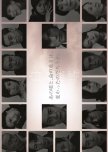"- There is no end to human desire, is there?
- That's because desire is the purest emotion there is"
For the whole time I was watching this drama, I couldn't stop thinking about how universal and timeless this story is and how it can be re-done over and over again without losing its meaning. That shows how insightful and well-thought-out the source material is. Desire and greed is a permanent part of human condition and we can make the best, as well as the worst, out of it. As we can see in The Great White Tower by the example of Zaizen's aspiration and Satomi's humanism. When you combine it with a multilayered plot about complex politics, interesting and unconventional characters and a solid dose of sublime symbolism, you'll got a memorable drama at least, a masterpiece at best.
The drama is divided into two arcs. First arc is about internal power struggle among the doctors of University Hospital and Zaizen's fight for professorship. It was clear to me that the hospital setting is very conventional, very symbolic, as it was more about what was happening and not where it happened. The meticulous political machinations exposed the true nature of doctors, seemingly the most rightheous and trustworthy class of people, as greedy, corrupted, selfish and egoistic.
With Goro Zaizen as the most self-righteous and cynical of them all. But I have to admit that up until his pettiness allowed him to make a grave mistake, I didn't really see any wrongdoings on his side. Yes, he was overly ambitious to the point of being totally selfish and merciless (and I wanted to punch him in the face for that), but he was true to himself and just played the game the rest of the world was playing. His surgical skills were masterful and he saved a lot of people, so why not use it for your own gain like money, fame, power? After all, what's wrong with having an ambition?
There is no limit to human greed... or is it? Which is the topic of the second arc of this drama. The lawsuit and the court case. This part is more introspective and focused on each character, as they all had to make a hard, and often life changing, decisions. If the first part of the show comes off as a little too raw, heavy and cynical at times, the second part is more humane and thought provoking. It criticizes hierarchal structure of society with the corrupt "top" (or a White Tower) seen here as the medical team of University Hospital. It's also more clichéd with the karmic ending, but I didn't really mind that because it fits the overall story. And my taste in this case (I'd prefer more brutally honest, borderline nihilistic ending) would propably cost this drama a lot of criticism lol.
Apart from exciting plot the other strong aspect of this show lays in well-written characters. I like how Zaizen and Satomi were shown as the polar opposites. One seemingly negates the other, but to me they were so alike. Both ambitious, with similar principles, but driven by the different desire. While one wants to be acknowledged for his craft as the greatest surgeon, the other wants to push further the research for the greater good, not for the fame. While Zaizen seeks power, Satomi seeks hope. While one cares about the result, the other focuses on treatment. But in the end, despie the constant disagreements, they were always full of respect for each other and their unusual friendship lasted till the end.
I also appreciated the recognizable secondary characters, such as Zaizen's father in law, Professor Ugai or - my absolute favorite - Professor Okouichi. And small character developments of Professor Azuma or his daughter, Saeko, were also nice. It's the other female characters that I had a problem with. Zaizen's wife and his lover, Keiko (the actress was fantastic tho). They contributed nothing to the story and failed the Bechdel Test, as they were nothing more than Zaizen's orbiters. I feel like they, especially Keiko, existed only to elevate Zaizen's position as this uber alpha male, which is... sexist.
Although I absolutely loved the symbolic nature of some scenes and the overall pathos this drama oozes with, I cannot for the love of me understand the Auschwitz scene. I feel like that's the second thing that didn't bring anything meaningful to the plot. I think the show tried to be too philosphical with this.
Overall, this drama hit all the right spots for me. It has complex politics, great writing, unconventional main character, fantastic acting, memorable ost and the enormous quantity of sublimity, so if you're into epic and thought provoking stories, then this is a show for you.
- That's because desire is the purest emotion there is"
For the whole time I was watching this drama, I couldn't stop thinking about how universal and timeless this story is and how it can be re-done over and over again without losing its meaning. That shows how insightful and well-thought-out the source material is. Desire and greed is a permanent part of human condition and we can make the best, as well as the worst, out of it. As we can see in The Great White Tower by the example of Zaizen's aspiration and Satomi's humanism. When you combine it with a multilayered plot about complex politics, interesting and unconventional characters and a solid dose of sublime symbolism, you'll got a memorable drama at least, a masterpiece at best.
The drama is divided into two arcs. First arc is about internal power struggle among the doctors of University Hospital and Zaizen's fight for professorship. It was clear to me that the hospital setting is very conventional, very symbolic, as it was more about what was happening and not where it happened. The meticulous political machinations exposed the true nature of doctors, seemingly the most rightheous and trustworthy class of people, as greedy, corrupted, selfish and egoistic.
With Goro Zaizen as the most self-righteous and cynical of them all. But I have to admit that up until his pettiness allowed him to make a grave mistake, I didn't really see any wrongdoings on his side. Yes, he was overly ambitious to the point of being totally selfish and merciless (and I wanted to punch him in the face for that), but he was true to himself and just played the game the rest of the world was playing. His surgical skills were masterful and he saved a lot of people, so why not use it for your own gain like money, fame, power? After all, what's wrong with having an ambition?
There is no limit to human greed... or is it? Which is the topic of the second arc of this drama. The lawsuit and the court case. This part is more introspective and focused on each character, as they all had to make a hard, and often life changing, decisions. If the first part of the show comes off as a little too raw, heavy and cynical at times, the second part is more humane and thought provoking. It criticizes hierarchal structure of society with the corrupt "top" (or a White Tower) seen here as the medical team of University Hospital. It's also more clichéd with the karmic ending, but I didn't really mind that because it fits the overall story. And my taste in this case (I'd prefer more brutally honest, borderline nihilistic ending) would propably cost this drama a lot of criticism lol.
Apart from exciting plot the other strong aspect of this show lays in well-written characters. I like how Zaizen and Satomi were shown as the polar opposites. One seemingly negates the other, but to me they were so alike. Both ambitious, with similar principles, but driven by the different desire. While one wants to be acknowledged for his craft as the greatest surgeon, the other wants to push further the research for the greater good, not for the fame. While Zaizen seeks power, Satomi seeks hope. While one cares about the result, the other focuses on treatment. But in the end, despie the constant disagreements, they were always full of respect for each other and their unusual friendship lasted till the end.
I also appreciated the recognizable secondary characters, such as Zaizen's father in law, Professor Ugai or - my absolute favorite - Professor Okouichi. And small character developments of Professor Azuma or his daughter, Saeko, were also nice. It's the other female characters that I had a problem with. Zaizen's wife and his lover, Keiko (the actress was fantastic tho). They contributed nothing to the story and failed the Bechdel Test, as they were nothing more than Zaizen's orbiters. I feel like they, especially Keiko, existed only to elevate Zaizen's position as this uber alpha male, which is... sexist.
Although I absolutely loved the symbolic nature of some scenes and the overall pathos this drama oozes with, I cannot for the love of me understand the Auschwitz scene. I feel like that's the second thing that didn't bring anything meaningful to the plot. I think the show tried to be too philosphical with this.
Overall, this drama hit all the right spots for me. It has complex politics, great writing, unconventional main character, fantastic acting, memorable ost and the enormous quantity of sublimity, so if you're into epic and thought provoking stories, then this is a show for you.
Was this review helpful to you?


 15
15 65
65 3
3























